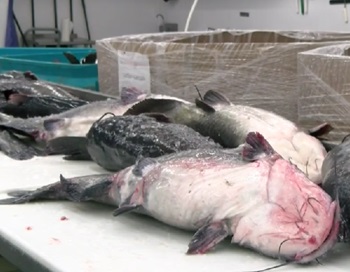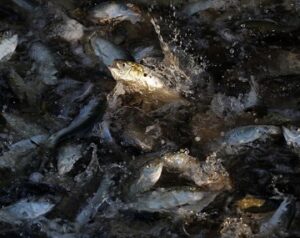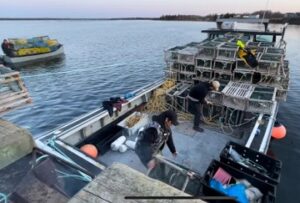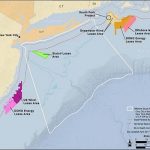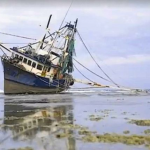The controversial menhaden fleet that supplies Omega Proteins’ Reedville plant is promising to limit areas in Chesapeake Bay where it will set its nets and catches fish. In a memorandum of understanding with the state, Ocean Harvesters said it wants to limit potential areas of conflict with other users of the Bay. Conservationists and recreational fishermen had pushed for limits, with some calling for an outright ban on catching menhaden in the Bay, after two spills of dead menhaden last year washed ashore. >click to read< 08:01
Tag Archives: Menhaden
The History of the Louisiana Menhaden Industry
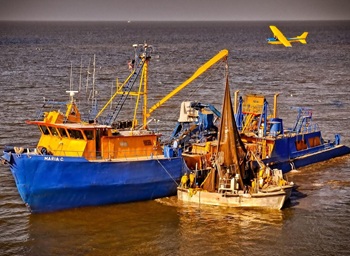 Few people realize that one of Louisiana’s most valuable fisheries isn’t for shrimp, oysters, or crab—but for a small, unassuming fish that has fueled our state and local economies: the menhaden. The first large-scale menhaden fishery in the U.S. began on the East Coast in the early 1800s, where the fish were processed for oil and fertilizer. By the late 19th century, the industry expanded into the Gulf, where Louisiana’s nutrient-rich estuaries provided an ideal habitat for vast menhaden populations. Processing plants soon emerged along the coast, and by the early 20th century, the Gulf menhaden fishery was a booming industry, supplying fish oil for industrial uses and fish meal for livestock feed. more, >>CLICK TO READ<< 07:03
Few people realize that one of Louisiana’s most valuable fisheries isn’t for shrimp, oysters, or crab—but for a small, unassuming fish that has fueled our state and local economies: the menhaden. The first large-scale menhaden fishery in the U.S. began on the East Coast in the early 1800s, where the fish were processed for oil and fertilizer. By the late 19th century, the industry expanded into the Gulf, where Louisiana’s nutrient-rich estuaries provided an ideal habitat for vast menhaden populations. Processing plants soon emerged along the coast, and by the early 20th century, the Gulf menhaden fishery was a booming industry, supplying fish oil for industrial uses and fish meal for livestock feed. more, >>CLICK TO READ<< 07:03
We’re not ‘sinister’: Menhaden fish processers want lawsuit dismissed
 As it said it would, Cooke Inc. has asked a judge to dismiss a lawsuit filed in a federal district court that claims the seafood company is defrauding the U.S. in the operation of the last East Coast menhaden processing facility. Known colloquially as pogies and bunker, menhaden fish kills have occasionally caused a stink at the Jersey Shore. The Canadian-based outfit said in its motion to dismiss that the two private citizens who brought the case against them are trying to make them appear “sinister.” “From the moment we became aware of this case, we have been eager to show that the allegations are inaccurate. Our legal filing underscores several key misstatements from the complaint and offers concrete evidence that they are false,” Cooke Inc. said in a prepared statement to the press. “We look forward to the court process and further opportunities to prove that the allegations are baseless.” more, >>CLICK TO READ<< 13:42
As it said it would, Cooke Inc. has asked a judge to dismiss a lawsuit filed in a federal district court that claims the seafood company is defrauding the U.S. in the operation of the last East Coast menhaden processing facility. Known colloquially as pogies and bunker, menhaden fish kills have occasionally caused a stink at the Jersey Shore. The Canadian-based outfit said in its motion to dismiss that the two private citizens who brought the case against them are trying to make them appear “sinister.” “From the moment we became aware of this case, we have been eager to show that the allegations are inaccurate. Our legal filing underscores several key misstatements from the complaint and offers concrete evidence that they are false,” Cooke Inc. said in a prepared statement to the press. “We look forward to the court process and further opportunities to prove that the allegations are baseless.” more, >>CLICK TO READ<< 13:42
Lesion-Causing Disease in Chesapeake Bay Bait Fish Alarms Watermen
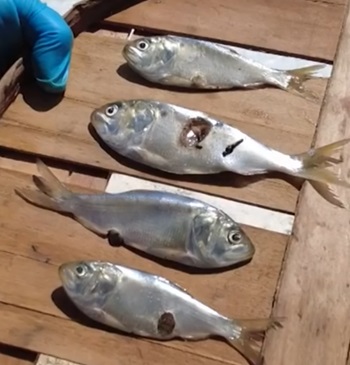 The disease, characterized by ulcers and lesions, is affecting menhaden, acrucial bait fish. Commercial crabber CJ Canby reports seeing dead menhaden floating in the bay on a weekly basis. “Last year, we had a 5-gallon bucket of menhaden, and 3 or 4 out of them had lesions. The other day, we cast-netted 23 fish, and 4 of them had lesions. So, the rate of lesions in menhaden has astronomically increased,” said Captain CJ Canby of the FV Miss Paula. Canby emphasizes the seriousness of the issue for watermen. “The fish are telling us there’s a problem, and it’s showing. more, >>CLICK TO READ<< 09:46
The disease, characterized by ulcers and lesions, is affecting menhaden, acrucial bait fish. Commercial crabber CJ Canby reports seeing dead menhaden floating in the bay on a weekly basis. “Last year, we had a 5-gallon bucket of menhaden, and 3 or 4 out of them had lesions. The other day, we cast-netted 23 fish, and 4 of them had lesions. So, the rate of lesions in menhaden has astronomically increased,” said Captain CJ Canby of the FV Miss Paula. Canby emphasizes the seriousness of the issue for watermen. “The fish are telling us there’s a problem, and it’s showing. more, >>CLICK TO READ<< 09:46
Louisiana pogy industry faces backlash as reports show more massive fish spills
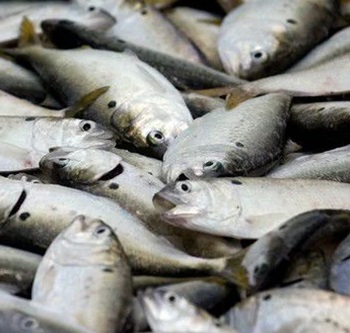 When a menhaden ‘mothership’ and its net boats spilled a million fish and left the floating mass to rot off the Louisiana coast, the menhaden industry attempted to ease public outrage and calls for tougher fishing rules with assurances that such incidents hardly ever happen. Nine million wasted fish might seem like a lot, but not when compared with the overall menhaden population, which is immense and shows no signs of decline, said Ben Landry, a spokesperson for Omega. “Sounds like Chicken Little to me,” he said. “This is a fish that numbers more than 100 billion in the Gulf. And there’s concern for 9 million fish? That’s a bit hyperbolic.” photos, more, >>click to read<< 11:48
When a menhaden ‘mothership’ and its net boats spilled a million fish and left the floating mass to rot off the Louisiana coast, the menhaden industry attempted to ease public outrage and calls for tougher fishing rules with assurances that such incidents hardly ever happen. Nine million wasted fish might seem like a lot, but not when compared with the overall menhaden population, which is immense and shows no signs of decline, said Ben Landry, a spokesperson for Omega. “Sounds like Chicken Little to me,” he said. “This is a fish that numbers more than 100 billion in the Gulf. And there’s concern for 9 million fish? That’s a bit hyperbolic.” photos, more, >>click to read<< 11:48
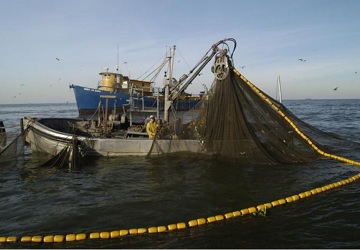
Menhaden ship captain cited for violating new fishing restrictions on Louisiana coast
The captain of a menhaden ship was cited for fishing within a restricted buffer zone off Terrebonne Parish near Vermillion Bay early this month, the first such citation under new rules. According to the state Department of Wildlife and Fisheries, Michael J. Tapper, 47, of Moss Point, Miss. used his 154-foot “mother ship” to fish “well inside” a new buffer zone that restricts menhaden fishing within a quarter mile of the coast. The new restrictions, which went into effect last year, established even larger buffers around Elmer’s Island, Grand Isle and Grand Terre Island. The citation is the first under the restrictions. >click to read< 10:34
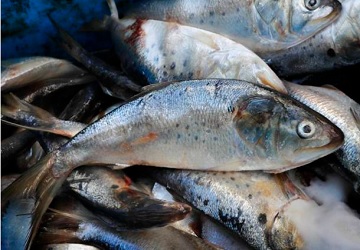
Virginia: General Assembly bill could help end debate of whether menhaden are overfished in the Chesapeake Bay
The state Senate passed a bill Wednesday to fund a study by the Virginia Institute of Marine Science to calculate menhaden populations in the state. The study would survey the number of fish over 18 months and the amount of bycatch, the unintended fish caught in the nets. The menhaden population along the Atlantic coast is considered healthy according to the Atlantic States Marine Fishery Commission, but groups such as the Virginia Saltwater Sport Fishing Association and the Chesapeake Bay Foundation want to know the numbers in the bay. Other fish, including striped bass, dine on menhaden. >click to read< 11:38

House backs limits, but pogie bill faces tough path in Senate
A bill that would put the first substantial limits on Louisiana’s biggest but least-regulated commercial fishery cleared the state House of Representatives this week but could face fierce opposition in the Senate. House Bill 1033 would cap the menhaden catch in Louisiana waters at 573 million pounds per year and require menhaden fishing vessels to report daily locations and catch amounts to the state. This year’s bill was backed by conservation and recreational fishing groups but opposed by the menhaden industry and some of the communities that depend on it for jobs and tax dollars. >click to read< 11:54

Surge in baitfish catch is a boon to Maine’s lobstermen
Maine’s lobster fishermen typically bait their traps with dead herring, but a scientific assessment in 2020 found that herring are overfished, and quotas for the fish were reduced dramatically. The loss of herring has increased the price of bait and made it harder for many fishermen to trap lobsters. However, losing herring has been offset somewhat by swelling catches of menhaden. Maine’s catch of menhaden, also called pogies or bunker, grew from about 6 million pounds in 2016 to more than 24 million pounds last year. >click to read< 11:28
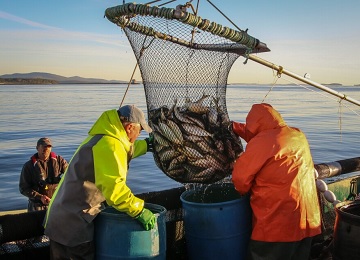
Pogies are back in Maine, and lobstermen say they’re more valuable than ever
Lobstering in Maine requires lots of bait, but Atlantic herring, a favored bait, are in short supply. Over the past few years, rebounding menhaden have been taking up the slack. Jamie Steeves, the lobster dealer who owns the boat the crew uses to catch the pogies, will sell the fish to lobstermen from the dock. “Let’s put it this way. If we weren’t catching pogies, and I say we as a whole, the industry, all my friends, those around us, if we weren’t catching them, this industry as lobstering would be in a lot of trouble,,, photos, video, >click to read< 16:53
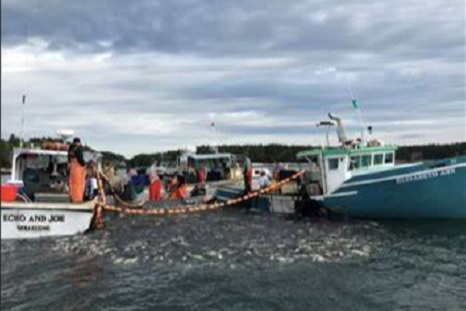
“Networks”: A rare, real look at the lives of lobstermen
“That funny looking water’s moving closer, Brooke,” Wallace says, motioning off in the nearby distance with his head as his hands work on the mooring. “That’s awful funny looking.” “Networks” is Mohnkern’s first film, and it tells a tightly focused story of a group of lobstermen from the Phippsburg village of West Point who hope to catch the shiny, surface-breaking fish known as pogies, or menhaden, causing all the ruckus in the water. It’s a story for the ages, men chasing fish and the consequences of their quest. But in just a few minutes, Mohnkern also manages to tell a story of a community of fishermen coming together for their common good and spotlights the economic impact of the migratory patterns of baitfish. >click to read< 09:32
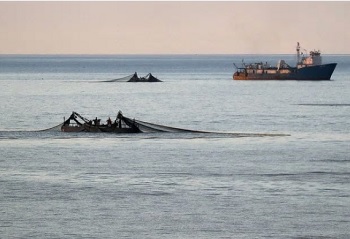
Chesapeake Bay’s menhaden catch cut drastically, along with Omega Protein quota
Virginia is cutting this year’s Chesapeake Bay menhaden catch by more than 80% from last year’s landings in order to end a federal moratorium.
Federal fisheries officials said they’d bar fishing for menhaden in the Bay this year — as long as the fish were headed for Omega Protein’s fish oil and fishmeal plant in Reedville — because the state had not enacted a 41.5% cut to 51,000 tons in Omega’s quota, which had been imposed by the Atlantic States Marine Fisheries Commission in 2017. But the Atlantic States commission has not found that menhaden were overfished. “To be perfectly clear, there is no conservation basis for the Chesapeake Bay cap. No scientific methodology was used in setting the Chesapeake Bay cap by the ASMFC, ,,, >click to read< 15:35
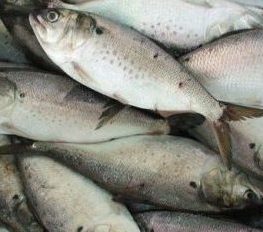
Maine will create a commercial menhaden fishing license in 2021, won’t close growing bait fishery as previously planned.
Stories of those who had hoped to jump into menhaden fishing, and pleas from lobstermen in search of affordable bait, persuaded state lawmakers to keep the menhaden fishery open while the state works out details of its proposed licensing system.,, A legislative committee voted in favor of the Department of Marine Resources’ menhaden licensing bill, but only after deleting a section of the bill that would have set a “control date” for the menhaden fishery. A control date is a cutoff date that can be used to decide who is eligible to fish. >click to read< 11:08

Menhaden regulations have plagued lawmakers for decades.
Every year, the drama has followed the same lines. Some lawmakers and environmentalists concerned about the health of the valuable fishery, the only one managed by the legislature rather than regulators, push to transfer its management to the Virginia Marine Resources Commission. The industry and its unionized fishermen, concerned that regulators will cramp their business, push back. It’s been perhaps the state’s dullest political tug-of-war. But then, this winter, it ended when Omega Protein, the Reedville-based Canadian company that is the largest single player in the U.S. menhaden industry, told a Senate panel that it supported legislation to hand over fishery management to the VMRC. >click to read< 07:39

Science Center for Marine Fisheries Releases Evaluation and Summary of Latest Atlantic Menhaden Assessments
Dr. Steve Cadrin, Professor at the School for Marine Science and Technology at the University of Massachusetts Dartmouth and past President of the American Institute of Fishery Research Biologists, has completed an evaluation and summary of the latest Southeast Data, Assessment, and Review (SEDAR) Atlantic menhaden stock assessments. >click to read< 15:58

Maine DMR wants to close the pogy fishery to newcomers for 2 years while it crafts a new FMP/Enforcement plan.
“Closing fisheries is kind of a radical step and a dangerous step because it eliminates diversity,” said Commissioner Pat Keliher. “We’re not saying close it in perpetuity. Close it to see if there is a different approach here that would allow us to get both enforcement and reporting back under control.” Keliher said the 2019 menhaden season was challenging because of “a perfect storm of circumstances.” A sharp reduction in the herring quota spurred huge growth in the menhaden fleet, with 50 new boats rushing to satisfy the $485 million lobster industry’s need for substitute bait. >click to read< 07:23

EDITORIAL: Menhaden harvest limit actually means something
Last week, the Atlantic States Marine Fisheries Commission, the partnership, or “interstate compact,” that sets harvest limits for 27 fisheries up and down the Atlantic Coast, officially accused Virginia of allowing Omega Protein to overfish,,, In a December 2017 press release on the deal, Cooke hinted at a new use: “The animal feed ingredients produced by Omega Protein are an important component in Cooke Aquaculture’s production of healthy Atlantic salmon, making this acquisition a strategic move that greatly enhances Cooke’s vertical integration.” So instead of rockfish, maybe the Bay’s menhaden will be feeding farm-raised salmon in Canada. >click to read< 09:15
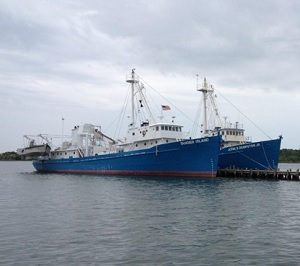
The One that Didn’t Get Away: The Atlantic’s Largest Menhaden Fishing Fleet Faces Penalties
At a meeting this week in New Hampshire, commissioners from Florida to Maine voted unanimously to find Virginia out of compliance. Eric Reid is a commercial fisherman who represented Rhode Island at this week’s meeting. “I got boats sitting at the dock too. And when the fed said fishing is over, we stayed tied to the dock. We didn’t write a letter saying ‘hey I’ve got 150 employees as well and we need to make money and we’re going.’ We stopped,” Reid noted. “It kinda rubs my nose in it a little bit. I don’t care for it.” >click to read< 08:50

The Battle Over Menhaden Harvesting in the Bay
“The menhaden issue is a very complex issue the commission is currently facing,” says Toni Kerns, ASMFC’s director of Interstate Fisheries Management Program and Policy Development. The ASMFC is a group that, under federal law, manages and oversees coastal fisheries including the menhaden species. Essentially, the ASMFC has regulatory authority. Video, >click to read< 08:30
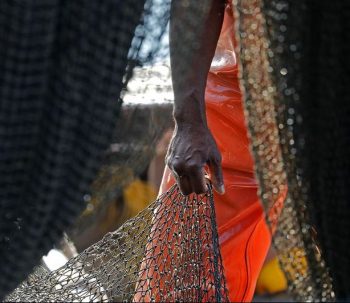
A trip with the lone company chasing menhaden in a 140-year tradition on the Chesapeake Bay
It’s an industry that once made the village of Reedville one of the most prosperous in the state — big, brightly-painted three-story Victorian mansions, bedecked with gingerbread woodwork under their generous shade trees line Main Street in testimony to those long gone days. These days, menhaden are at the center of an obscure, if fiercely fought, political battle over who should catch them where, and whether the Omega Proteins fleet that still sails from Reedville is harvesting too many from the Bay. Among the reasons for that concern: Menhaden are an important food source for striped bass. Photo’s >click to read< 07:54
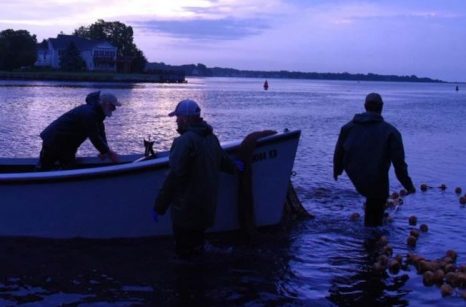
‘Do I need life insurance?’ A morning as a Peconic fisherman
Rain is the forecast as Tom Gariepy arrives at the Peconic River just before 5 a.m. for one of the last bunker hauls of the season. He backs his trailered sharpie bait boat into the still, 68-degree water, parks his pickup on the road and waits for veteran fishermen Lenny Nilson and Kenny Anderson before the three push off in two boats for the waters around Indian Island, in Riverhead. On the way out, Gariepy sees a giant school of bunker just beyond the launch point, but Nilson has a feeling about the waters to the north and east. >click to read<14:17
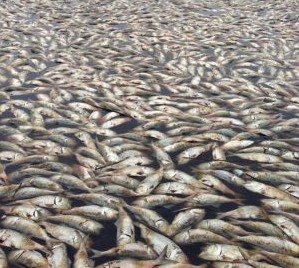
Sores, lesions: Early fish kill in Neuse worries those who use the river
State environmental crews are investigating a disturbing fish kill in the Neuse River. They’re trying to figure out why numerous schools of menhaden are breaking out in sores and dying in the river near New Bern.,,, The images are grotesque. Fish in the Neuse River swimming around with their insides hanging out.,, In a nutshell, the river is in very poor health and declining and continuing to decline,” said JoAnn Burkholder,,, Hans Paerl, said he believes pollution stirred up by Hurricane Florence could be the culprit now. And Paerl warns that water quality could deteriorate all summer if the weather is hot and dry. Scientists blame nutrient pollution from urban runoff, large industrial farms and waste water treatment plants. >click to read<11:25

Our view: Abundant menhaden draw whales and endless dispute over its fishery
A sustainable and growing menhaden fishery, though, isn’t enough for some. Since at least 1888, when the Rod and Reel Association claimed commercial menhaden boats were taking fish better left as food for species they liked to catch and eat, people have fought over the best use for menhaden. In the fall of 2017, a coalition of environmental and sport fishing interests, partly led by a unit of the Pew Charitable Trusts, successfully lobbied the fisheries commission to switch to a unique new management approach for a fishery, one based on estimates of how the menhaden population affects other fish and wildlife that prey upon it. >click to read<10:42

Virginia escapes sanction — for now — that could shut down menhaden fishing
A threat to shut down Virginia’s menhaden fishery disappeared after an interstate commission decided it wouldn’t find the state out of a compliance with a new quota for the oily fish. The Atlantic States Marine Fisheries Commission cut the quota for menhaden caught in Chesapeake Bay by purse-seine vessels by 42 percent back in 2017 — but the General Assembly balked this year and last at enacting that lower quota into state law. This month, the commission indefinitely postponed taking any action to find Virginia out of compliance, a finding that could trigger a federal moratorium on the fishery. >click to read<10:51

Notorious Menhaden Slayer Reb Raymer Released from Prison
Following two years of incarceration for perpetrating a series of fish kills on the East End, prolific mehaden killer Reb Raymer is back on the streets this week. The Hampton Bays resident, who holds a longstanding grudge against the baitfish, also known as bunker, is responsible for the death of hundreds of thousands of menhaden between June 2015 and November 2016 when he was finally arrested for his crimes. Raymer was convicted of ecoterrorism and cruelty to animals in Hamptons Superior Court early last year,,, >click to read<07:28
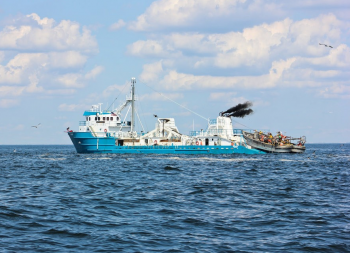
New York’s Whales Love Bunker. So Do Fishing Boats. Conflict Ensues.
It has been a bountiful summer for bunker in the waters off New York, and for local whale spotters. Bunker, a favorite food of many larger predators, including whales, are enjoying another year in a decade-long recovery.,,, On Aug. 30, a boat from Omega Protein lowered a net nearly six city blocks long into the water, about 25 miles southeast of the Rockaways, and pulled up about 800,000 pounds of bunker, also known as menhaden. On Sept. 6, Omega returned to the vicinity and hauled out nearly 2 million pounds more. Tom Paladino, a former charter fishing boat captain who started running whale watches from the American Princess in 2010 as local whale sightings began to grow, did not mince words. “We have a major issue with a fishing fleet coming in and taking all the food from the whales,” he told his passengers. Omega says it is doing nothing of the sort and is removing only a tiny fraction of the local menhaden that its spotter pilots have estimated to be in the tens of millions. “The best science shows that this is a completely sustainable fishery and the whale diet is not being impacted at all,” said an Omega spokesman, Ben Landry. > click to read<11:51
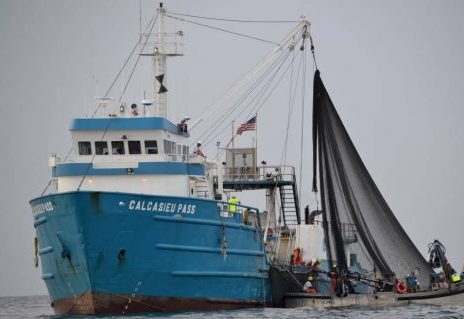
New York Activists Make False Accusations Against Menhaden Fishermen
Gotham Whale of Staten Island, New York and Menhaden Defenders posted material on Facebook suggesting that legal, regulated fishing of menhaden in federal waters off New York and New Jersey would leave marine mammals such as humpback whales and dolphins with nothing to eat, resulting in the whales moving to other waters. The two posts specifically cited normal fishing activity by Omega Protein Corporation vessels. A blog post by a photographer, linked to by Gotham Whale, falsely accused the fishermen of marine mammal interactions. >click to read<12:58

A Political Fish Tale That Could Bait Trump
A fish story isn’t one without a bit of exaggeration. Consider menhaden: A bony, little fish used for bait and to make fertilizer, animal feed, dietary supplements and lipstick, it is vital to marine ecology as a bottom-of-the-food-chain staple for other creatures, finned and winged, and as an oceanic janitor, scrubbing waters clean of algae. And menhaden is the protagonist in an economic and political tale that could lead to a confrontation between President Trump and the state that denied him a sweep of the South in 2016: Virginia.,,, And this fish story includes a little-noticed and rare breach between Gov. Ralph Northam and his predecessor, fellow Democrat Terry McAuliffe,,, Racing to the exits, McAuliffe, whose political action committee received $15,000 from Omega in 2017, initiated an appeal to the Atlantic States Marine Fisheries Commission to forgo the new restriction. >click to read<12:24

2018 Mass. DMF fishing regulations go into effect April 20
The Division of Marine Fisheries (DMF) has enacted new regulations, which were informed in part by this winter’s public hearings. The regulations were reviewed and approved by the Marine Fisheries Advisory Commission at its March 15 meeting, and go into effect on April 20. The most substantive change is an adjustment to the open commercial fishing days for black sea bass. The new open commercial fishing days are Sundays, Tuesdays, and Thursdays.,, The commercial black sea bass season will begin on Tuesday, July 10.,, During the inshore small-mesh trawl squid fishery, April 23–June 9, trawlers will be allowed to retain a 50-pound bycatch limit of black sea bass. >click to read<18:00






